

Daymare 1998 was originally intended to be a Resident Evil 2 remake. A love letter to the classic survival-horror game, Daymare 1998 set out to recreate the horror, tension, and thrills that came packed into it the Capcom classic.
Unsurprisingly, Capcom shut the game down as they were working on their own iteration of their classic game, the RE2 Remake. But that didn't stop developer Invader Studios from funneling their passion into the Daymare 1998 we have today.
Much like the zombies that threaten its world, the console version of Daymare 1998 is a sluggish and ugly take on the Resident Evil formula.
Daymare 1998 Review: An Ugly Blast from the Past
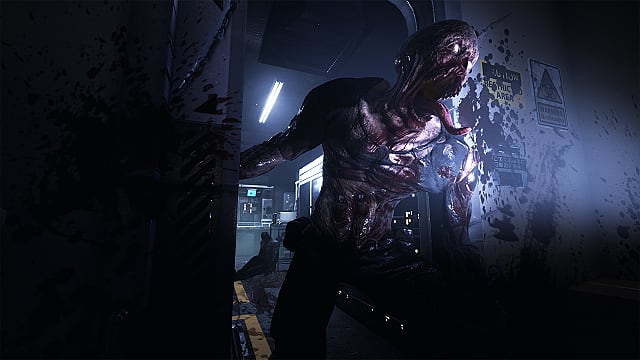
Daymare 1998 takes place from the perspectives of multiple protagonists after a lab incident infects a local town with a deadly virus. Of course, the virus causes the town's inhabitants to become vicious monsters. The game's three characters have their own motivations and goals for dealing with this crisis, some being better than others, although, all are plagued by poor writing and lackluster voice acting.
The first of these characters is Liev, a special agent first tasked to deal with this mess. Following Liev, Daymare 1998 starts off remarkably weak, presenting you with a protagonist who is unlikeable, brutal, and hard to relate to. Beginning with one of the game's lesser-written characters undoubtedly provides a roadblock to some of Daymare 1998's better moments lying past the opening level.
Then there's Raven, who somewhat holds the middle ground among the three characters. Though Revan is still difficult to relate to, his sections at least come later in the story, after the player has been able to invest more into the story. Revan's sections make for some of Daymare's better moments.
However, Samuel, a forest ranger who is the most grounded of the protagonists and dethatched from the events in play, is perhaps the best.
One of the most striking parts of Samuel's personality is that he suffers from an illness that affects his mental state. Without his medication, Samuel is prone to hallucinations (diagnosed as "Daymare Syndrome".) This makes for some of the most intense and blood-curdling moments of the game, as you question what is fact or fiction.
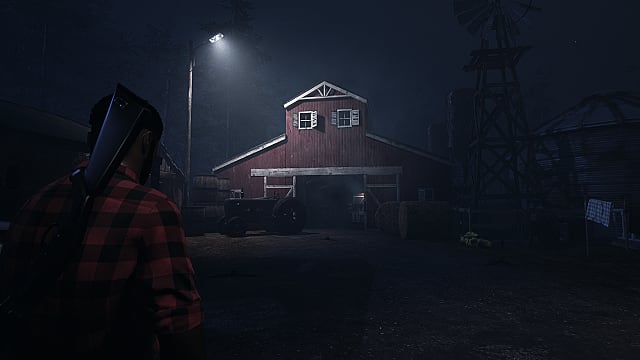
Daymare 1998's plot gains momentum as the events accelerate towards their conclusion, and how these narratives intertwine is one of the game's charms. However, the script that plays as an homage to the cheesiness of Resident Evil without any self-awareness.
While the plot may do very little to captivate one's attention, the atmosphere will no doubt get under your skin. If there's one thing Invader Studios has achieved, it's the tone of the games Daymare riffs on. It lacks any real identity of its own, but the passion for horror games of old shines through the cracks. Adding to that are the scattered notes that further flesh out the world, as every corner lurks with unspeakable horror and ludicrous puzzles that must be solved to advance.
The main problem with Daymare 1998 lies with a vision that far surpasses the budget in hand. The dark, grainy art style is worsened by character models that look like 1980s action figures. It's unfortunate that by its console release, two Resident Evil remakes have hit the market, which shows how much life the genre still has in its undead corpse.
Compared to its PC counterpart, the console release of Daymare 1998 feels extremely rough and undernourished. The PC version is capable of 60 frames per second, while the console version is locked at 30. While a higher frame rate isn't necessary for one to enjoy a game, it helps to make games that lack the higher-fidelity graphics look less polished.
That's not to mention a higher framerate ensures combat is far more seamless.
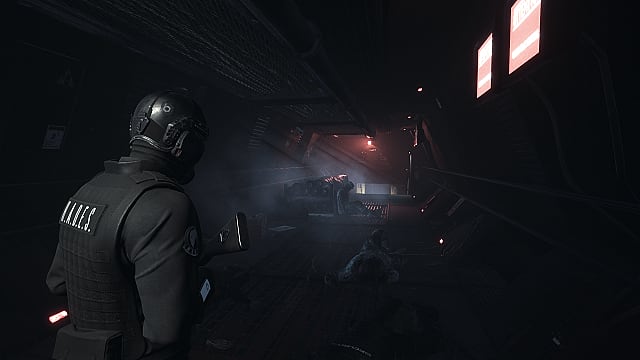
There's also a wide array of technical bugs and glitches plaguing Daymare 1998, perhaps far more reaching than the virus itself. Hit detection on enemies can be guesswork as bullets can seemingly pass through them, the audio mix balance can fluctuate, and on more than one occasion, game-breaking glitches are prevalent.
One such glitch saw me glitch into an enemy spawn zone where I was greeted by a developer message. Obviously, that's not intended for players.
It would be easy to look past these issues which can be fixed with a patch or two if the general gameplay was engaging enough. The problem is that it is not. Combat in Daymare 1998 ranges from passable to downright terrible. Coming into contact with normal enemies causes for some of the tension the genre is known for, but throw in any advanced enemy types and the clunky feel of Daymare 1998 rears its ugly head.
Fairly early on, stronger enemy types are introduced which ruin all feeling of tension when they become mere bullet sponges. Instead, these hulking beasts become tedious and a means for all your precious ammo to be wasted. For a game that prides itself in embracing survival-horror roots and item management, having such powerful enemies fairly often ruins the momentum and brings you out of the horror in a mindless rage.
To make things worse, an incredibly irritating and unnecessary reloading system is in play. While some guns can be instantly reloaded, others first have to have their magazine reloaded before being reloaded into the gun itself. What this means is constant item management that is a perpetual nuisance. Instead of dialing up the horror, it just gets in the way.
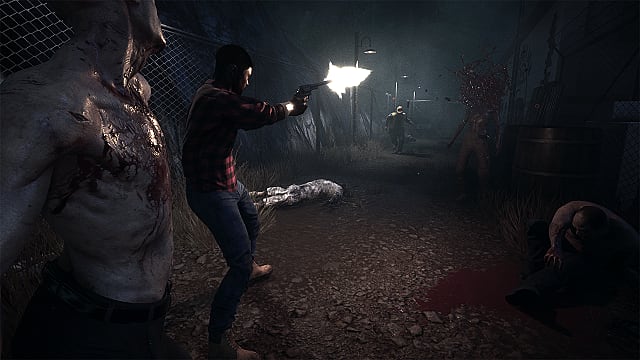
You can alternate between a slow or fast reload. Unsurprisingly, slow reload comes at reduced speed, but you keep your magazine. Utilizing fast reload will refill your gun, but you'll drop your magazine and have to pick it up again.
It's possible to reload guns directly from the inventory management menu, but you're always left wondering, "Why?". Incorporating this system into the game adds an unnecessary hurdle and creates multiple aggravating situations in which you'll have to fumble with the inventory system amidst a fight where you're getting attack from all corners.
It doesn't help that the inventory menu is slower to respond than other games of the genre.
The level design of Daymare 1998 is a mixed bag, too, varying from linear affairs to more open-ended environments that are much more engaging. Early on, the story remains fairly linear, showcasing no regard for exploration. When you finally get to Samuel, you'll be greeted to a more open level design, completing multiple objectives across varying levels.
One thing Daymare 1998 absolutely nails, however, is its puzzles, perhaps more so than the Resident Evil remakes. Here the puzzles can be extremely challenging but rewarding. Some puzzles, such as the one involving Greek symbols, can be hard to solve, but perseverance and patience make for some of Daymare 1998's best moments.
Daymare 1998 Review — The Bottom Line
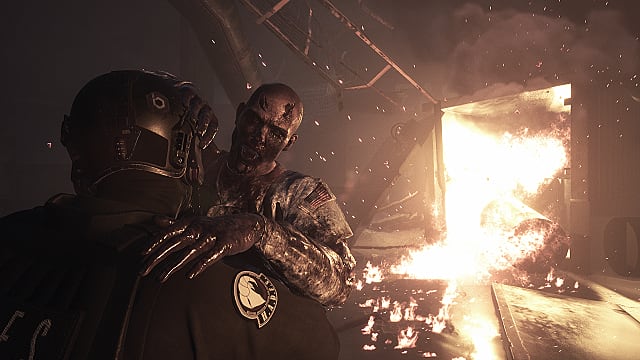
Pros
- Hard but rewarding puzzles
- Dreadfully heavy atmosphere throughout
Cons:
- Riddled with technical issues
- Poor script and plot
- Dated and undercooked visuals for a console release
- Sluggish controls and poor item management
Daymare 1998 is a perfect example of great ideas executed poorly. Despite the constant missteps that hold it back multiple console generations, there's no doubt elements of charm here and there. By shifting between two gameplay styles, Daymare 1998 never conveys a consistent message with what it's trying to achieve. When it works, it's pure nightmare fuelled fun, but when it doesn't, it feels like a grossly missed opportunity.
Strong puzzles and atmosphere aren't enough to salvage a game riddled with bugs, weak design choices, and sluggish controls. Much like the monsters you put down, Daymare 1998 is better left off dead when the original concept is still being so well-done with contemporary remakes.
[Note: A copy of Daymare 1998 was provided by Invader Studios for the purpose of this review.]
0 comments:
Post a Comment